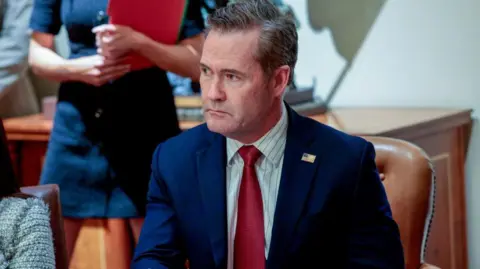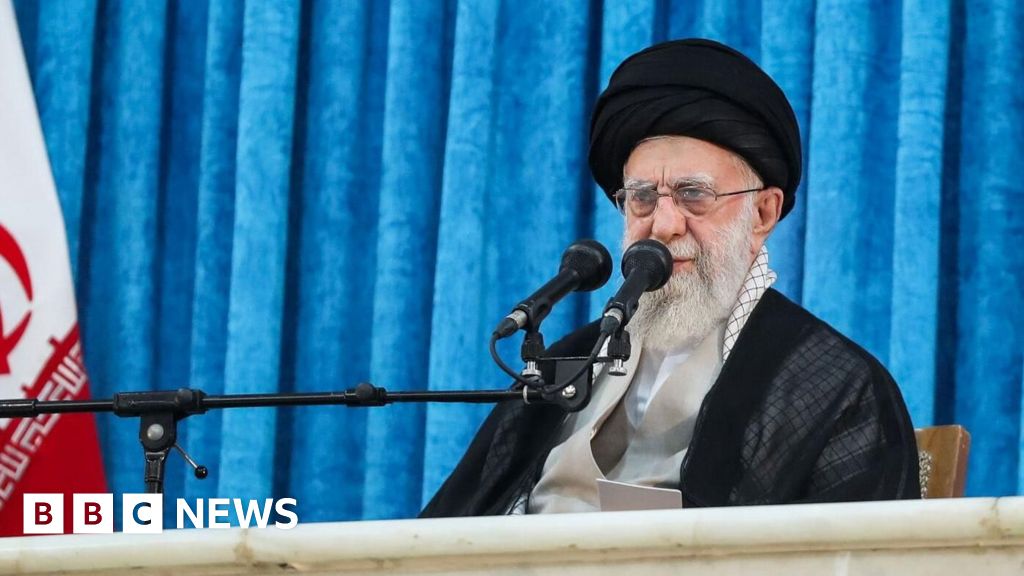ARTICLE AD BOX

 Bloomberg
Bloomberg
White House National Security Adviser Mike Waltz
For the past 48 hours, top White House officials have faced questions from lawmakers and the press about how a journalist came to join a sensitive group chat for an upcoming military operation - and why President Donald Trump's national security team was sharing sensitive information in an unsecure manner.
The Atlantic first reported details of the group chat on the platform Signal after its editor in chief, Jeffrey Goldberg, was added to it. He followed the thread as top Trump administration officials discussed upcoming military strikes against the Houthis in Yemen.
A National Security Council spokesman later confirmed that the portions of the chat that Mr Goldberg initially shared "appears to be authentic".
The Atlantic then on Wednesday published the entire text thread that showed the detailed and potentially classified rundown for a March strike on Yemen after Mr Goldberg and the publication faced pushback from the Trump administration.
While the thread appears to have contained sensitive information, there is still much that remains unknown. Here are six lingering questions regarding so-called "Signal-gate".
Was the information classified or not?
The Trump administration maintains the information shared in the chat was not classified.
Director of National Intelligence Tulsi Gabbard told lawmakers during a congressional hearing that the Signal chat was "candid and sensitive" but "no classified information was shared".
But under questioning, she and CIA Director John Ratcliffe appeared uncertain about the classification of the attack plan. They later emphasised that Hegseth had the power to classify and declassify the type of details that were shared.
Hegseth has denied sharing classified material, but experts are sceptical that this type of sensitive information would not carry that kind of designation.
"The idea this wasn't classified information at the time is inconceivable," Glenn Gerstell, former general counsel of the National Security Agency, told the BBC. "I don't know if they declassified it afterwards but any imminent military action involving American troops would have been classified at the time."
White House press secretary Karoline Leavitt said Wednesday that "no war plans" were discussed on the chat. Instead, she characterised the information shared as "sensitive policy discussions".
Jamil Jaffer, executive director of the National Security Institute at George Mason University, said that Hegseth did not send "an operational plan for World War Three, or for the Pacific region".
"But at the same time," Mr Jaffer said, "these are operational details that could, if released publicly, put American lives at risk or jeopardise the success of the operation."
Who added Goldberg to the group and why?
Watch: ‘Why did they invite me?’ - Goldberg says Trump officials should accept mistake
In his original article, Mr Goldberg reports that on 11 March he initially "received a connection request on Signal from a user identified as Michael Waltz", Trump's national security adviser.
Two days later, he writes that he received a notice that he was to be included in a Signal group titled the "Houthi PC small group."
Mr Goldberg reports that the group received a message from Waltz, which also noted one of his deputies was "pulling together" a team of top staffers relevant to the discussion.
On Tuesday, Trump suggested that a "lower level" staffer for Waltz added Mr Goldberg to the chat.
However, Waltz himself told Fox News' Laura Ingraham: "I take full responsibility. I built the - I built the group."
Secretary of State Marco Rubio, who was also in the group, said on Wednesday that someone had made a "mistake" in adding Mr Goldberg.
Will there be a congressional investigation?
It remains to be seen whether Congress will launch oversight investigations, which it has the power to pursue.
Trump is a Republican, and both chambers of Congress - the House of Representatives and the Senate - are controlled by his party.
That means committees who have oversight of the executive branch, military, and intelligence community are run by Republicans.
Republican lawmakers have emphatically supported the Trump administration's agenda to this point, so it seems improbable that they would support investigations into the Signal chat.
Democrats in the House are reportedly trying to force a vote on a "Resolution of Inquiry" that would require the Trump administration to hand over records related to the incident, according to Reuters, but they do not have a majority.
While some Republicans have raised concerns over the leak, few have appeared eager to cross the president.
Will anyone step down over the Signal incident?
Watch: Is the Signal chat leak involving Trump officials a big deal?
Democratic lawmakers are calling for resignations, but at the moment, none of the officials involved in the Signal chat have stepped down.
Hegseth and Waltz have faced the most calls to resign, and some cabinet officials have said that their process will go under review.
"I think there'll be reforms and changes made," Rubio told reporters on Wednesday.
Still, it is unclear if the president will ask any members of his team to step down. So far, the White House has launched a full-court defence of the Signal chat and the officials who participated.
Trump told reporters in the Oval Office that Waltz "took responsibility", but has previously maintained that he has not lost confidence in his national security adviser.
Hegseth also appears safe from Trump's ire for now.
"Hegseth is doing a great job. He had nothing to do with this," the president said.
How extensive is the Trump administration's use of Signal?
The use of Signal to discuss the Houthi strikes posed broader questions about how Trump's top staffers are sharing and discussing sensitive information.
Gabbard testified on Wednesday that Signal came "pre-installed on government devices".
She cited guidance from the Cybersecurity and Infrastructure Security Agency, which mentioned Signal as an example of a messaging service with end-to-end encryption.
Ratcliffe earlier testified to Congress that Signal had been installed on his devices when he took over the CIA.
But it remains uncertain if security officials had provided guidance about using Signal for discussing military operations like the strikes against the Houthis.
"Whether these circumstances were approved or not is still not clear," Mr Jaffer said.
CBS News, the BBC's US partner, has reported, however, that the US National Security Agency had warned employees against using Signal due to "a vulnerability" that they had identified.
"The use of Signal by common targets of surveillance and espionage activity has made the application a high value target to intercept sensitive information," warned the NSA bulletin that was shared a month before the Houthi Strike chat.
Why was Trump's team using Signal to discuss a strike?
The group chat appears to suggest that the officials' discussion was one that had continued from the White House Situation Room, one of the most secure venues in the US government.
This is unusual. Oftentimes further discussion or the inclusion of team members who cannot attend in person is done via secure rooms called sensitive compartmented information facility, or SCIFs.
Top-ranking national security officials have these SCIFs installed in their offices and homes to ensure the protection of sensitive information and discussions.
That can add a layer of complexity to planning and coordination, however, which may have led to lax security system standards.
"Whatever they have might not be effective enough," Mr Jaffer said. "Or there's so many restrictions on it, that it forces senior officials into workarounds that themselves might create vulnerabilities."

 2 months ago
35
2 months ago
35








 English (US) ·
English (US) ·